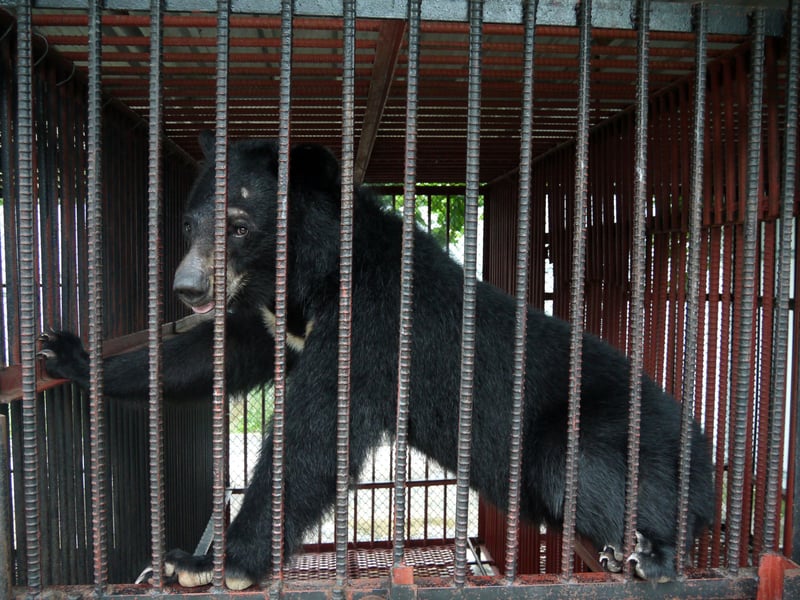
South Korea takes landmark step to end the cruel bear bile industry
Press release
World Animal Protection is calling on countries that keep captive bears for traditional medicine to follow the example of South Korea as it ends the captive breeding of bears for their bile.
South Korea has taken a landmark step forward in ending its bear bile industry, with the completion of a government funded programme to sterilise all captive bears used for their bile.
The sterilisation programme was the result of 14 years of campaigning by global animal welfare NGO, World Animal Protection and local partner Green Korea United (GKU), in consultation with the South Korean Government and bear owners. This will prevent any new bears from entering the industry, with the bears in the industry today the last to suffer for their bile.
World Animal Protection and Green Korea United (GKU) have been working to end the South Korean bear bile industry since 2003, moving South Korean people to lobby for better protection for bears.
In 2014 a landmark agreement between the government of South Korea and the Bear Farmers Association of South Korea resulted in a voluntary exit plan from the industry for bear farmers. This included the sterilisation programme, encouraging bear farmers to have their captive bears sterilised to stop the breeding of new bears for the industry, which was completed in early 2017.
Gilbert Sape, Head of Bears and Traditional Medicine at World Animal Protection, says:
“This is a significant victory for wildlife. It sends out a clear message that it is unacceptable for governments to continue to support industries that profit from the suffering and exploitation of animals.
“The Government of South Korea, moved by over a decade of campaigning by World Animal Protection and GKU, has clearly demonstrated it is possible to sustainably exit from the bear bile industry.
“South Korea’s example lays down the gauntlet to other countries in Asia, and particularly to China. There is no excuse to continue to support this industry, especially when there are humane alternatives readily available.”
In Asia, more than 20,000 bears are forced to suffer in captivity for their gallbladders and bile, which is used in a variety of products, but primarily for the traditional medicine market. China is by far the largest producer and consumer of bear bile and gallbladders.
A new white paper by World Animal Protection and GKU sets out a clear pathway for other governments to end the bear bile industry. It documents the 14-year journey leading to the sterilisation programme and imminent end of the South Korean bear bile industry.
In South Korea, the completion of the sterilisation programme marks the beginning of the end of the industry, which has seen growing condemnation from South Koreans.
MP Jeong-Mi Lee of the Justice Party of South Korea says,
"The completion of the sterilisation programme for farmed bears is a crucial milestone to reinforce animal welfare in South Korea. It will become a catalyst to effectively resolve other animal issues.”
Jeseon Bae, Director, Ecosystem Conservation Team, of Green Korea United (GKU), added:
“The conclusion of the sterilisation programme is a milestone moment for South Korea. It’s an important example of people working together to change government policies, and create real and lasting change for animals.
“However, while it remains legal to raise and slaughter bears for their bile our work will continue. We must ensure that the outcomes of the sterilisation programme progress, is monitored and enforced, and the outcome of no new bears entering the industry is strictly adhered to.”
World Animal Protection is committed to ending the needless suffering of bears, and has been working to protect bears for over twenty years; bringing an end to some of the worst cases of their exploitation across the world.
We will continue to lobby for change until bears are no longer forced to suffer in captivity for their bile, but remain in the wild, where they belong.
ENDS
Note to editors
For more information or to arrange an interview please contact
Thousands of bears have been held captive in bear bile facilities in a number of Asian countries, including South Korea, China, Vietnam, Laos and Myanmar, since the 1980s. Their bile is turned into powders, capsules and ointments used in traditional medicines.
World Animal Protection and GKU have co-authored the white paper: Ending bear bile farming in South Korea. This paper documents the 14-year journey leading to the sterilisation programme and imminent end of the South Korean bear bile industry.
https://www.worldanimalprotection.org/sites/default/files/int_files/bea…
The sterilisation programme has seen 967 captive bears sterilised between 2014 and 2016. A DNA database has been developed to support the sterilisation programme, making it easier to monitor and manage the remaining captive bears. Today, there are 719 sterilised bears being kept for their bile on 39 farms in South Korea, with no unsterilised bears left in the industry. World Animal Protection and GKU will continue to work with the government to ensure the best possible outcome for these bears, while ensuring no new bears enter the industry.
In 2016, World Animal Protection research revealed 97% of Chinese people believe the bear bile industry is very cruel, with almost 84% of those surveyed hoping to see the industry banned. In the same year, a new report by one of China’s leading government think tanks, set out clear recommendations to end the bear bile industry in China within the next 20 years - signalling the end of this cruel industry is inevitable.
https://www.worldanimalprotection.org/node/13986